By Elina Moraitopoulou
We put together our reflections on a paper which we shared with the POEM consortium and management team. Our argumentation included points for carbon-neutral conferencing, sharing responsibility for online facilitation and the design of the conference. We would push the limits of creative online exchange, envisioning stronger future collaborations via the virtual realm and contributing to a series of ‘good practices’ for our upcoming meetings as well as other European programs with structures similar to ours.
Our proposal was welcomed by the consortium and management team and as September was approaching and the pandemic was still prevalent in our lives, the format we proposed seemed like the sole way to go forward.
“Allow coffee mugs and cats on screen”!
Right, so how do you embark on a seven-day journey of almost consecutive videoconferencing without running the risk of draining yourself? Well, you cannot really. But we thought we could at least acknowledge the shared risk of fatigue and by being honest about it, commit to checking in with our bodies and minds regularly over the course of the weeks.
It is Tuesday, the 15th of September, 9:45 CEST. One after the other, all our POEM faces are popping up in the Zoom ‘room’. A Zoom board is soon pulled up, replacing our faces. This is going to be our “Shared Principles” for our online Knowledge Hub, which we would create together. Be honest. What do you need others to know -and yourself to be reminded of- during the next couple of weeks? Stretch…nap between sessions…take toilet breaks…and, most importantly, allow coffee mugs and cats on screen!
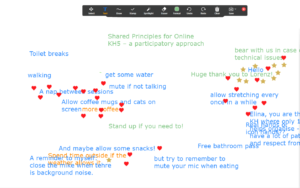
POEM Zoom Board: Shared Principles for Online KH5 – a participatory approach.

Something like an ice-breaker? ”Our POEM socially distanced map”, a visual memory of the different locations from which we were dialing in -or at least a good attempt. We also landed in some imaginary spaces, dropping hearts near Russia and Italy, while the Zoom frame covered the hearts of our Southern colleagues in Cyprus. #digitalplayground
This KH is finding us, the POEM fellows, at the beginning of our third year of research. This critical time for our projects is reflected in the structure of our KH agenda which is mostly oriented around our research progress reports, our questions and anxieties and the sharing of some of our first findings.
For our first days, supervisors and PhD fellows gather in a plenary discussion around the individual research projects. Each fellow has 15 minutes to share their progress and address two questions to the plenary, for feedback and discussion. Although the ‘space’ is not ideally intimate, given the presence of a large group of both supervisors and fellow colleagues, this sharing session creates the opportunity to share not only on our research successes but also its challenges, and how the lockdown increased some of the latter as it coincided with large part of our data collection phase – for some of us at least. After all, creating a space for vulnerability is essential to create connection. Some of us use this first day to speak ‘publicly’ for the first time about what we considered until then to be ‘just personal’ blind spots, only to realize that the same obstacles also concerned other people .
This individual sharing and feedback (in the form of a Q&A) is followed by a second day of exchange, this time across individual projects. It is during that second KH day that we create a space to discuss for the first time the notion of future(s) and how those are progressively ‘emerging’ as a common thread both inside and across our individual works. How can we capture the ‘future’ in our methods? As Ton Otto, POEM supervisor from Aarhus University, highlights, methods of ethnography and design understand human action in different temporal orientations, the former putting on the spotlight the “presence of the past in the present”, whereas the latter being more “radically future oriented”. And so he continues by arguing that “emergence” can prove a promising “perspective” to address the question of future in our methods (Otto, 2018).
Guest lecture and POEM toolbox co-creation session
Thursday starts off with an online guest lecture, attended by academics, practitioners and members of the general public alike. Our guest lecturer is Jérémy Lachal, Ashoka Fellow and co-founder of Libraries Without Borders – BSF, an organization that stands halfway between a humanitarian NGO and a social enterprise, and whose mission is to “bring access to knowledge when it’s most needed”. Under the title “Libraries as Generators of Collective Narrative and Social Inclusion”, Jérémy’s lecture pushes the limits of our understanding of libraries to more mobile and agile formats, populated with content created by the community and found at the heart of remote communities, refugee camps, and conflict zones. As Jérémy explains, some of the BSF tools such as the Ideas Box act as “pre-figurations of future libraries” in conflict areas where such resources are currently not accessible/available to the local community. You can now watch the guest lecture and Q&A session recording on our POEM website.
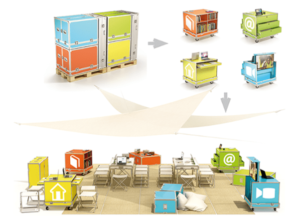
BSF’s Ideas Box: a mobile “pop up” multimedia center and learning hub. Designed by Philippe Starck
Inspired by this idea of knowledge accessibility and having seen the different formats it can take, we continue in our day with a co-creation session between POEM fellows and supervisors to proceed with the design of our POEM toolbox. The toolbox aims to be an alternative metaphor for knowledge dissemination whereby fellows contribute some of the methodologies and tools with which we experimented during our PhDs. Stay tuned…
POEM Toolbox loading, please, wait. Source.
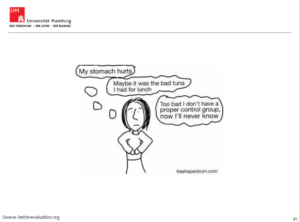
Our first week’s sessions segwayed into our two training units of the second KH week. For the first day, Prof Silke Boenigk (University of Hamburg) leads us through the principles of non-profit management, followed by a day dedicated to social impact measurement, facilitated by Dr Peter Schubert (University of Hamburg). Both these sessions created an opportunity to reflect upon and discuss critically the impact of our own projects and these projects tied together as POEM. To push the limits of social impact evaluation, we need to return back to a fundamental question: what do we value? And what do we want to measure?
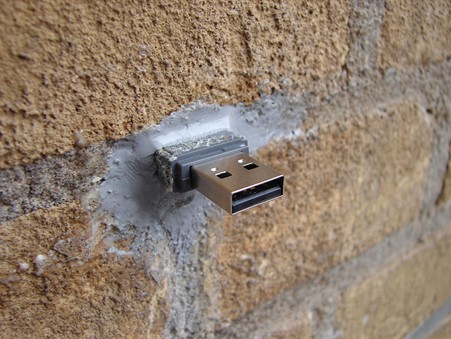
One of Aram Bartholl’s USB dead drops, a USB mass storage device installed in a public space. Source.
While a USB dead drop could be a way to disseminate our research with different publics, what else can we think of? What dissemination formats are ‘relevant’ considering the purpose, participants, and audiences, as well as the nature of our diverse research data? How do we as researchers of participatory memory practices reach out, disseminate, and involve our audiences? The last two days of our Knowledge Hub focuses on such questions, which we explore through four working groups: of co-curated exhibitions, social media outputs, guides/tutorials, and other
visual representation formats. Some format ideas are developed further, whereas others are put back in the cupboard or scrapped completely.
Keep an eye on the next newsletter(s) to find out what the final formats will look like :).
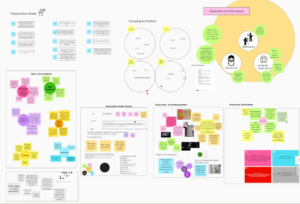
An overview of our Open Space brainstorming. Source.
KH5 organization team would like to thank the ensemble of POEM fellows and supervisors for their invaluable contribution in designing and facilitating the different sessions, all of which have catalyzed the advancement of our thinking as we move into our third PhD year. This was a genuinely collaborative effort. Big thank you to everyone!

